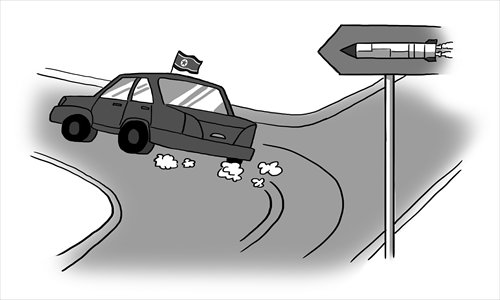North Korea locked back into bleak cycle

On December 12, 2012, North Korea launched a rocket, which it claimed was to put a satellite into orbit. On January 22, after complex negotiations, the UN Security Council (UNSC) passed Resolution 2087 condemning the launch.
The condemnation was based on claims that the rocket was part of an intercontinental ballistic missile (ICBM) program and was also in breach of earlier UNSC resolutions.
Neither event came as much surprise. North Korea had attempted a similar launch in April 2012 to mark the centenary of Kim Il-sung's birth. That failed, but by December North Korea made it clear that it would make another attempt.
Once the launch took place, it was obvious that a number of countries, led by the US and South Korea, would demand that the UNSC should react to another North Korean "provocation."
North Korea has been subject to international and bilateral sanctions since it conducted nuclear tests in 2006 and 2009. Resolution 2087 adds more organizations and people to the existing list of banks, trading companies and individuals already singled out.
And if the sanctions were predictable, so has been the North Korean reaction. A statement from North Korea's Ministry of Foreign Affairs condemned the resolution as unfair discrimination and said that the country would take measures to bolster its nuclear and other defense measures. The statement added that North Korea would not take part in any further discussion on the issue of denuclearization of the Korean Peninsula.
A day later, a statement from the North Korean National Defense Commission also condemned the UN resolution as illegal, but then abandoned any pretence that the December launch was for peaceful scientific space exploration: "We do not hide that the various satellites and long-range rockets we will continue to launch, as well as the high-level nuclear test we will proceed with, are aimed at our arch-enemy, the United States."
Although this second statement gave no timescale, signs of movement on the ground at the site of the previous two tests can be seemed as a clear indication that another nuclear test is planned. North Korea is clearly embarked on a program of nuclear development that has a timetable of its own.
What happens if there is another test? Another resolution, no doubt, which on present showing will not stop North Korea.
Indeed, the constant round of resolutions only seems to confirm the leadership in their view that they face a hostile world and need the means to deter attacks.
The present resolution and new calls for action over the country's human rights' record are both seen as evidence of hostility.
North Korea's leadership has noted how intervention in Libya only came after it had abandoned parts of its weapons' program and how human rights' issues justified international action.
It is hard to see how to get away from the present impasse.
International attempts to end the North Korean nuclear program are not going to stop, and neither is the North Korean suspicion that the long-term aim is regime change.
Yet the situation has looked black in the past with apparently little chance of movement. China and Russia, while accepting the resolution, have indicated that pushing North Korea further into a corner is not helpful.
Just a year ago, the US and North Korea were negotiating a nuclear freeze and appeared to have reached an agreement. That agreement collapsed in the wake of the unsuccessful April 2012 rocket test, but it might be revived now that US President Barack Obama has a new mandate and a new team.
In South Korea, the victory of President-elect Park Geun-hye may allow some fresh thinking on relations with North Korea.
And, there is always hope that North Korea's own new leadership might begin to move away from continued confrontation.
For the present, however, the outlook is bleak with the dreary cycle set to continue.
The author is a research associate at the Centre of Korean Studies, University of London, and formerly a British diplomat in North Korea. opinion@globaltimes.com.cn